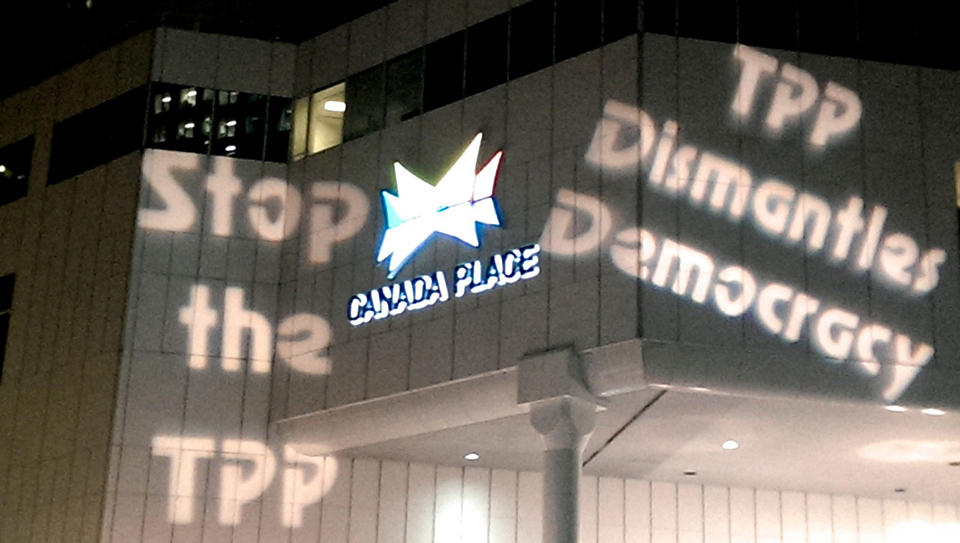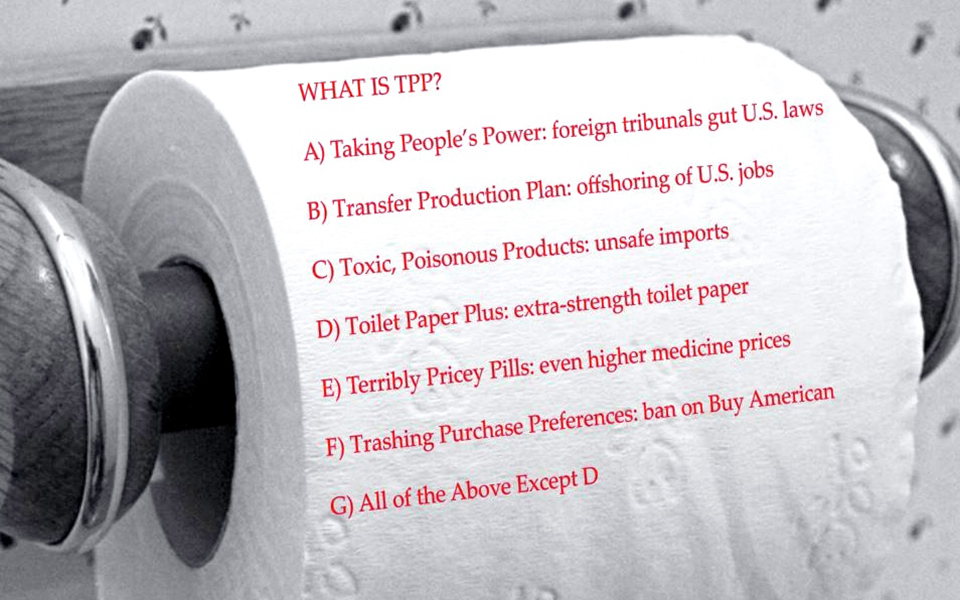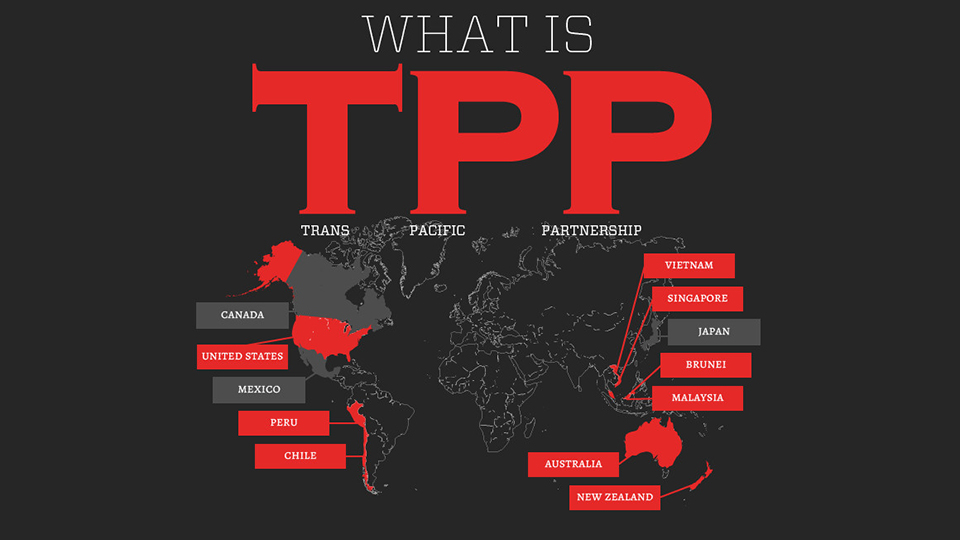What seemed like an impossibility – stopping the Trans-Pacific Partnership – is now becoming an inevitability thanks to the solidarity of a “movement of movements“ that opposes rigged corporate trade agreements. Now, the people are on the verge of a major victory against transnational corporate power.
Comments by Senate Majority Leader Harry Reid indicate that Fast Track Trade Promotion Authority which is essential for passing the Trans-Pacific Partnership and other controversial trade agreements may be dead in the Senate as he has no plans to bring it to a floor vote.
This comes in the midst of a ten day blitz of movements that brings together Americans concerned with the environment, food safety, GMO labeling, healthcare, labor, worker rights, Internet and other issues.
Tens of thousands of phones calls and even more emails have been sent to Congress through coalition sites like Stop Fast Track. Friday is an intercontinental day of action and 50 protests are planned in the U.S., Canada and Mexico against corporate trade policies like NAFTA and the TPP.
President Obama did not help the cause of passage of fast track in the State of Union where he made a vague passing reference to trade promotion authority but no specific mention of the TPP or its Atlantic counterpart, TAFTA. His lukewarm comment showed Congress his administration will not be making fast track a top priority, probably because they have counted the votes and see it would be a likely legislative defeat for the administration.
If President Obama is not going to risk offending voters, why should members of Congress?
This week, a poll conducted by Hart Research Associates, a Democratic pollster, and Chesapeake Beach Consulting, a Republican polling firm, announced that voter opposition to fast track authorization is broad, with 62% saying they oppose fast track authority for the TPP trade deal, versus 28% who say they favor it.
By large margins Americans recognize that on wages and jobs, the environment and food safety the TPP will make things worse. With a Democratic president, Republicans overwhelmingly oppose giving fast track authority to President Obama (87% oppose), as do Independents (66%), and the normally anti-corporate trade Democratic voters favor giving the Democratic president fast track (53%).
This poll will decrease the likelihood that House Republicans will allow a vote on fast track since nearly 90% of their voters oppose it. Already, Speaker Boehner put forward a high hurdle saying he would not allow a floor vote unless 50 Democrats came out for fast track. These poll results are not numbers that will be ignored in an election year when both parties are already unpopular.
Stopping the TPP seemed unlikely less than a year ago. But a campaign to educate the activist base of all the issues impacted by the TPP, pulling in more cautions non-profit organizations and unions as well as a growing awareness in the public, has resulted in what looked liked a sure thing trade agreement becoming so toxic that politicians up for re-election do not want to be associated with it. This success shows that the people have more power than they realize.
Of course, we are well aware that the corporations do not give up, that we need to remain active in our opposition in 2014 and that this issue will come back in future years. Activists must remain vigilant to stop corporate trade agreements that undermine all we work for.
At the same time we need to show a new path were fair trade can be designed for the betterment of people and the planet, negotiated in open with the participation of people all around the world. Our goal is not only to defeat fast track and the TPP but end the era of rigged corporate trade agreements negotiated in secret. It is a goal the social movement can achieve if we remain focused on the task.
Reid Shunts TPA Onto Slow Track
Senate Majority Leader Harry Reid (D-Nev.) on Wednesday suggested he will not bring legislation to the floor that would grant President Obama greater trade powers.
Reid said he is “against” trade promotion authority (TPA) legislation — often called “fast track” — that, if passed, would make it easier for Obama to negotiate trade deals by preventing Congress from amending them.
“I’m against fast track,” said Reid, who told reporters he would not guarantee floor time for legislation by Senate Finance Committee Chairman Max Baucus (D-Mont.), who is set to leave the Senate upon his confirmation as ambassador to China.
“We’ll see,” Reid said of the bill. “Everyone would be well advised just to not push this right now.”
Reid had recently called the legislation “controversial,” and cast several votes against trade deals during former President George W. Bush’s administration.
“Everyone knows how I feel about this. Sen. Baucus knows. Sen. [Ron] Wyden [(D-Ore.)] knows,” he said in reference to the incoming chairman of the powerful Finance panel.
Reid’s comments show how difficult it will be for Obama to win fast track authority from Congress — and that his biggest problem will be with fellow Democrats.
The Baucus measure is co-sponsored by Senate Finance Committee ranking member Orrin Hatch (R-Utah) and is backed in the House by Ways and Means Committee Chairman Dave Camp (R-Mich.).
But the House measure has not won over House Democrats, and Republicans have warned the White House it needs to build Democratic support for the measure.
Reid’s criticism of the legislation was made less than 24 hours after Obama used his State of the Union address to ask the Congress to pass it.
“We need to work together on tools like bipartisan trade promotion authority to protect our workers, protect our environment and open new markets to new goods stamped ‘Made in the USA,’ ” Obama said in his speech.
“China and Europe aren’t standing on the sidelines. Neither should we,” the president said.
The legislation is important to an administration negotiating trade deals with the European Union, and a group of Asian and Latin American countries under the Trans-Pacific Partnership.
Obama in 2010 also set a goal of doubling U.S. exports by 2015.
Trade promotion authority would put timetables on congressional consideration of trade deals, and would prevent Congress from amending them in exchange for the administration meeting specific goals laid out in the authority.
Bush used the authority to negotiate a series of individual trade deals. Trading partners are thought to be more likely to sign such pacts if they know the deals will be considered by Congress and will not be changed.
The White House on Wednesday downplayed Reid’s comments.
“Leader Reid has always been clear on his position on this particular issue,” a White House official told The Hill.
“As the president said last night, he will continue to work to enact bipartisan trade promotion authority to protect our workers and environment and open markets to new goods stamped ‘Made in the USA,’ and we will not cede this important opportunity for American workers and businesses to our competitors.”
Democrats said the light-handed approach Obama took on the issue in his State of the Union address shows he realizes it isn’t likely to happen. Trade took up only two lines of the president’s speech, which was more than an hour long.
Rep. Rosa DeLauro (D-Conn.) said the president’s lack of attention to the issue “demonstrates the broad opposition” to fast track and trade deals that she said undermine his economic goals of growing jobs and increasing wages.
Business groups and Republicans, however, were disappointed with the comments.
“Awful timing,” Bill Reinsch, president of the National Foreign Trade Council, said of Reid’s comments. “What it means is the fast track bill is not on a fast track.”
In a blog post Tuesday, John Murphy, vice president of international affairs for the U.S. Chamber of Commerce, wrote that Obama needs to call lawmakers as well as lobby them in person.
“He needs to work the phone and spend time on Capitol Hill every week until it’s done. It’s that important,” Murphy wrote.
U.S. Trade Representative Michael Froman has nearly taken up residence on Capitol Hill this month to talk to Democrats about fast track and the TPP, which negotiators are pushing to finish within the next several months.
But Lori Wallach, director of Public Citizen’s Global Trade Watch, said Reid’s rejection of the bill reflects congressional “distaste” for trade strategies of old and a desire to create a new mechanism that ensures intimate congressional involvement.
Reinsch said opposition to trade deals “is impressively well-organized and is doing an awful lot of work out in the communities where we have not been. That’s a handicap of ours.”
He said trade groups will respond, though.
“I think we can get there. The business community is at its best when there is an actual tangible bill for them to lobby for, and that’s what we have now. People will step up,” Reinsch said.
Tony Fratto, who worked as a White House spokesman for Bush and is now managing partner at Hamilton Place Strategies, argued that Reid’s comments “pulled the rug out from maybe the only bipartisan economic policy left in Washington, and kicked the president in the shins for good measure.”
“Harry Reid’s decision to block these deals cripples America’s historic role as the global leader in advancing free trade, and it is a personal embarrassment to the president.”
Alexander Bolton and Vicki Needham, The Hill
3 WAYS TO SHOW YOUR SUPPORT
- Log in to post comments
















